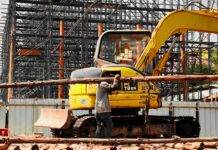
How Many Insurance Policies are Required in Construction?
Introduction
How Many Insurance Policies are Required in Construction? : In the world of construction, where uncertainties lurk around every corner, insurance plays a pivotal role in mitigating risks and ensuring the successful completion of projects. Construction sites are rife with potential hazards, and even the most meticulously planned projects can encounter unexpected challenges. To safeguard against these uncertainties, multiple insurance policies come into play. In this article, we’ll delve into the various insurance policies required in the construction industry, ensuring a comprehensive understanding of the protective measures in place.
The Foundation: Liability Insurance
General Liability Insurance
General liability insurance is the cornerstone of construction insurance policies. It provides coverage for bodily injuries, property damage, and personal injuries that may occur on the construction site. This policy ensures that contractors and builders are financially protected from unforeseen accidents.
Professional Liability Insurance
Professional liability insurance, often known as errors and omissions insurance, is crucial for architects, engineers, and design professionals. It covers claims of negligence and professional errors that can lead to project delays or financial losses.
Protecting the Workforce: Workers’ Compensation
Workers’ Compensation Insurance
Workers’ compensation is vital for construction companies to cover medical expenses and lost wages for employees who are injured on the job. It helps maintain a safe work environment and promotes the welfare of workers.
Safeguarding the Investment: Property Insurance
Builder’s Risk Insurance
Builder’s risk insurance is designed to protect construction projects from property damage caused by theft, vandalism, fire, or natural disasters. It ensures that the project remains on track even when faced with unexpected setbacks.
Installation Floater Insurance
Installation floater insurance covers materials, equipment, and fixtures during transit or installation. It safeguards against damage or theft while these essential components are in transit or being integrated into the project.
Ensuring Project Completion: Performance Bonds
Performance Bonds
Performance bonds are financial guarantees that ensure contractors complete their projects as per the contract terms. They provide clients with a safety net, assuring them that the project will be completed, even if the contractor faces financial difficulties.
Environmental Considerations
Environmental Liability Insurance
In an era of increasing environmental awareness, construction projects must consider their impact on the environment. Environmental liability insurance covers costs associated with pollution or environmental damage caused by construction activities.
Conclusion
The construction industry is a complex and high-risk field, making insurance policies an indispensable part of project planning and execution. From liability insurance to workers’ compensation, each policy serves a unique purpose in mitigating risks and ensuring the successful completion of construction projects. By understanding and utilizing these insurance options, stakeholders can safeguard their investments and protect the well-being of their workforce.
Construction Safety Basic Knowledge
Silica Dust Exposure in Construction
Masonry Hazards and Precautions
FAQs
Is general liability insurance enough to cover all construction-related risks?
General liability insurance is essential but may not cover all risks. It’s advisable to assess your project’s specific needs and consider additional policies like builder’s risk or environmental liability insurance.
Are performance bonds required for every construction project?
Performance bonds are typically required for larger projects or government contracts. Smaller projects may not necessitate them, but it’s essential to check contract requirements.
Can I use the same insurance policy for multiple construction projects?
While some policies can cover multiple projects, it’s often more practical to have project-specific policies tailored to the unique risks associated with each endeavor.
Are subcontractors responsible for their insurance coverage?
Yes, subcontractors are generally responsible for their insurance coverage. However, it’s crucial to verify their policies and ensure they meet project requirements.
How can I assess the environmental impact of my construction project?
Consult with environmental experts and consider environmental impact assessments to determine the potential risks and necessary insurance coverage for your project.
























